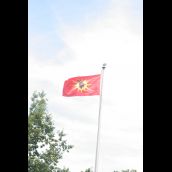Over 1,500 people from across New Brunswick and beyond marched through Fredericton yesterday to demand an end to hydraulic fracking and shale gas exploration in the province. Concern over the effects that hydraulic fracking may have on the province's water, for this generation and for those to come, brought out strong representation from the province's English, French, and First Nations communities.
The march wound its way through town, finishing at the Legislative Assembly, where a range of speakers addressed the peaceful, but incensed, crowd.
"The Wabanaki people are not here to celebrate New Brunswick today," said Alma Brooks, a representative of the Wabanaki Confederacy. "To me New Brunswick is just a government, nothing more. You see the flag flying up there (the Mohawk Warrior flag, which had replaced the provincial flag outside of the Legislative Assembly), that speaks the truth."
Central to the growing concern over fracking in New Brunswick is the province's newly-hatched, and largely one-sided, partnership with South Western Energy (SWN). SWN is not the only company looking to frack New Brunswick, but the magnitude and scope of the Texas/Arkansas-headquartered company has the locals worried. Thanks to a March 2010 deal with the New Brunswick Department of Natural Resources, SWN holds exclusive license to explore 2,518,518 'net undeveloped acres' of New Brunswick. 'Net undeveloped acres' is corporate for 'nature'.
In return, SWN has promised to invest $47 million into the province over the next three years. While upfront, $47 million might seem like a chunk of change, the untold millions in gas royalties that stand to flow out of the province make it look like small peanuts. As well, the very real potential for environmental disaster is difficult, if at all possible, to put into financial terms.
Of course, there is always the perrenial promise of job creation in exchange for resource extraction. But Derek Telasco, for one, sees this as a low-hanging fruit not even worth picking.
"People are saying there's jobs." Says Telasco, co-founder of Ban Fracking NB. "Like we're going to get these jobs here. First of all...we don't have the infrastructure for drilling like they do in Texas, Arkansas or Pensylvania...this is a new industry here. So what kind of jobs are going to be here? We don't have the people trained. You're going to get low-end, sweeper jobs, and clean-up crew, you'll be out there with a mop picking up the mess underneath, leaking. We're going to sell out our grandchildren's future in this province, we're going to take that kind of risk with our water?”
The NB government, in an attempt to placate the masses, and perhaps to save itself from being on the receiving end of a class-action lawsuit, unveiled, on June 23rd, a framework of regulations for potential frackers in the province. Judging by yesterday's turnout, the crowd was less than satistfied by Department of Natural Resources Minister Bruce Northrup, and said regulations.
Northrup's regs call for baseline testing for wells in close proximity to frack jobs, disclosure of the chemicals used when fracking, and security bonds for potential household damage due to fracking. SWN, it should be mentioned, is currently facing, and has faced in the past, class-action lawsuits in Arkansas and Pennsylvania. When dealing with the hundreds of millions in profits, however, security bonds for damaged households in New Brunswick are most likely acceptable losses to a company with the girth of SWN. It should also be mentioned that as natural gas prices continue to fall worldwide, SWN will most likely be continuing on an aggressive production schedule.
Telasco, for his part, fears that the NB government is eager to move forward on this, attempting to get their fracking dreams off the ground before the public can catch on to the risks involved. The question of clean water is understandably an emotional one, and public reaction across the province has at times been heated.
"My concern is that there's a number of issues that we're fighting against in New Brunswick." says Telasco. "One is a 25% illiteracy rate. (SWN's) not fracking right now, they're seismic testing. And (the people are) getting really scared. What I'm worried about is that somebody is going to go too far and somebody's going to get shot. In my opinion we can't lose that moral high ground that we have by having a non-violent means of protest. When there's fracking trucks, we don't have to go and vandalize the fracking trucks."
Atlantic Canada's public concern over fracking is not limited to New Brunswick. Solidarity rallies were held yesterday in Inverness, Baddeck, and Truro, Nova Scotia, Charlottetown, PEI, and St. John's, Newfoundland. Indeed, as Hazel Richardson of the Sierra Club of Canada pointed out, many in the Maritime region of Canada have been affected by fracking. As was recently revealed, the Debert Waste Water Facility, owned by Atlantic Industrial Services (AIS), and located in Debert, Nova Scotia, currently handles fracking wastewater from New Brunswick. While AIS representatives have assured the public that they are operating within their guidelines in handling fracking wastewater, this news was disconcerting to many, especially in light of the fact that Nova Scotia is undergoing its own 'environmental assessment' of hydraulic fracking.
"There is a saying." said Richardson. "In a battle between the river and the rock, the river always wins. Not because it's stronger, but because it perseveres. The rock we face seems mountainous. The mining companies have deep pockets, and the government of our province seems so keen to snatch financial crumbs from the company plate, that it is rushing into action that is threatening our land, the wildlife, and ourselves. All of Atlantic Canada has been or is being negatively impacted by hydraulic fracturing. Together Atlantic Canadians stand and say 'No to Shale Gas.'"



